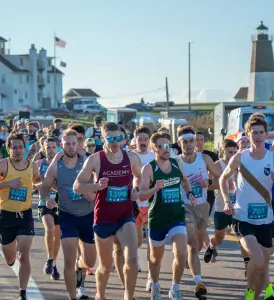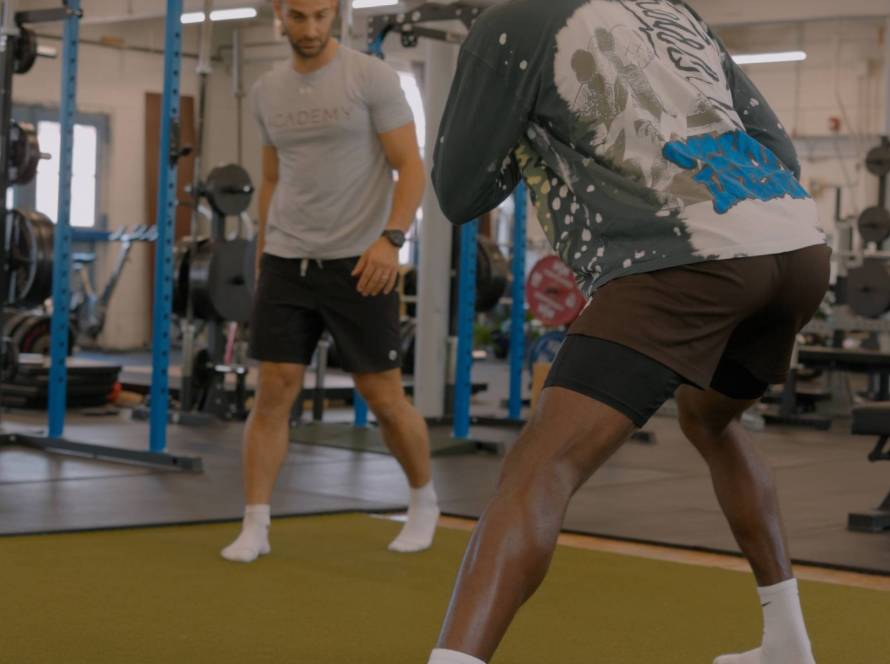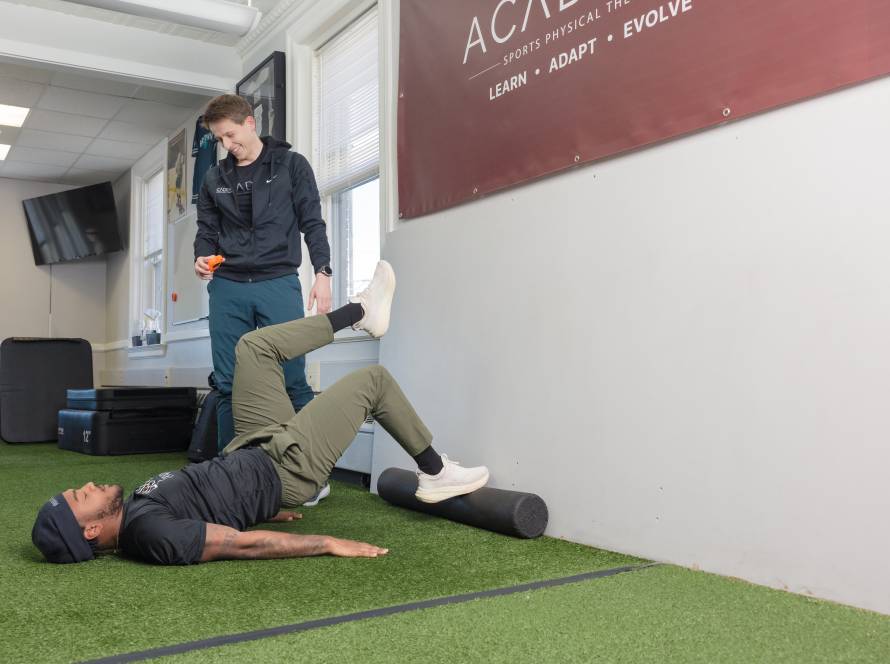
Academy’s own Dr. John Schilkowsky during his recent win at the Ocean Road 10k.
Your Guide to Staying Active with Physical Therapy
Introduction
Whether you are starting your running journey or you’re a seasoned vet, you understand there’s nothing quite like that runner’s high. What do you do when knee pain starts hindering your training progress? This article aims to assist you in overcoming the obstacles of knee pain during running and how physical therapy with Academy Sports PT can get you back in action!
Understanding Knee Pain
Before exploring the relationship between running and knee pain, it’s crucial to understand the reasons behind the potential onset of knee discomfort. The knee is a complex joint and experiences considerable strain in everyday tasks, and even more with running and other high impact activities. Below are some relevant factors that may lead to knee pain.
-
- Overuse: too much too soon. Engaging in excessive running or other high-impact activities can lead to overuse injuries, resulting in knee pain. The repetitive nature of running can strain the knee joint and surrounding tissues.
-
- Muscular Weakness: With each running stride your lower extremity musculature experiences forces multiple times your body weight. Insufficient strength in the muscles around the hip, knee and ankle particularly the quadriceps, hamstrings gluteal and calf muscles, can lead to inadequate support for the joints, causing discomfort during running.
-
- Previous Injuries: A history of back, hip, knee and ankle injuries or surgeries can increase susceptibility to pain while running.
-
- Biomechanical Factors: Certain individuals may have pre disposition to biomechanical issues, limitations such as decreased joint range of motion or leg misalignment could make an individual more prone to knee pain.
- Improper Footwear: Running in inappropriate or worn-out shoes can disrupt biomechanics, leading to knee pain. Proper footwear is crucial for evenly distributing forces with each stride.
Common Running Related Knee Diagnoses
Knee pain can originate from various sources including muscles, tendons, ligaments, joints and bones. It’s essential to identify the root casue of the pain to effectively address and treat it. Common conditions leading to knee pain in runners include:
-
- Patellofemoral pain syndrome (PFPS): This is a repetitive strain injury that causes pain in the front of the knee. It can be caused by a kneecap that sits too high, muscle imbalance, or excessive friction between the kneecap and underlying bones
-
- Iliotibial band (ITB) syndrome: This causes pain on the outside of the knee and can be caused by overuse, overstrain, or biomechanical factors.
-
- Patellar tendonitis: Also known as jumper’s knee, this injury occurs when a tendon is overloaded and thickens. Symptoms include pain in the front of the knee, especially when squatting, jumping, or landing.
- Osteoarthritis: Degenerative joint disease that can cause pain, swelling and decreased range of motion in your knee.
The Role of Physical Therapy in Managing Knee Pain and Improving Performance
Let’s explore how physical therapy with Academy Sports PT can be instrumental in managing and overcoming this issue, enabling you to sustain your running progress!
-
- A Thorough Subjective History: The first step in physical therapy involves a comprehensive history of your knee pain and other relevant health information. Some key questions your physical therapist may ask include:
-
- How long have you been experiencing knee pain?
-
- Was there a specific event that caused pain or was the onset gradual?
-
- Are there particular activities/movements that reliably make pain better or worse?
-
- What is the quality of your pain?
-
- dull, sharpe, radiating, intensity of pain, location of pain
-
- What is the quality of your pain?
-
- A Thorough Subjective History: The first step in physical therapy involves a comprehensive history of your knee pain and other relevant health information. Some key questions your physical therapist may ask include:
-
- Physical Examination: Your Physical Therapist will analyze joint range of motion, muscular power, muscular strength, gait and the integrity of your ligaments and tenons to determine the underlying causes of your discomfort. At Academy Sports PT, we take a comprehensive approach to managing all of our athletes. Joints above (hip) and below (ankle) can significantly influence the involved joint. It is critical to assess, understand and address any limitations identified in these areas during the rehab process.
-
- Personalized Treatment Plan: Based on assessment results, your physical therapist will create a tailored treatment plan addressing your specific needs and goals. This plan may include manual therapy aimed at reducing pain and increasing joint range of motion, flexibility-enhancing stretches, exercises aimed at improving coordination, strength and power in relevant musculature.
-
- Running Analysis: Running is a skill. If knee pain is linked to running, your physical therapist may perform a running analysis to identify any biomechanical inefficiencies contributing to your discomfort. This analysis will help develop targeted strategies to improve your running form and minimize the risk of future injuries.
-
- Education and Prevention: Academy Sports PTs can provide valuable insights on sustainable training strategies. They can guide you on proper preparation prior to beginning a running routine, making modifications to your running when necessary to keep you training and strength training guidance aimed at maximizing running performance and longevity.
- Progress Tracking: Throughout your therapy, your physical therapist will monitor your progress and adjust your plan as needed, ensuring you are on track to meet your goals while alleviating knee pain.
Conclusion: Take the First Step Toward Pain-Free Running
At Academy Sports Physical Therapy, we specialize in helping motivated individuals like you overcome knee pain to regain mobility, strength and physical freedom. Utilize our expertise to get back to running and enjoying a vibrant, active life. Schedule your Initial Evaluation today!
Top 3 FAQs About Knee Pain:
1. Can knee pain be prevented while running? Yes, knee pain can often be prevented through proper preparation, suitable footwear, gradual increases in running intensity, and strength and coordination training focused on the muscles around the knee and lower extremity.
2. Is it safe to continue running with knee pain? It depends on the cause and severity of your knee pain. Consulting with a healthcare professional or physical therapist is essential to determine whether it’s safe to keep running or if adjustments to your routine are necessary.
3. How long does it take to recover from knee pain with physical therapy? Recovery duration varies by individual and depends on the underlying cause and severity of the pain. With a physical therapist’s guidance, many individuals see significant improvement within a few weeks to a few months.
Don’t let knee pain prevent you from staying active and training to the level of your potential! Contact us at Academy Sports PT today to set up an Initial Evaluation today!



